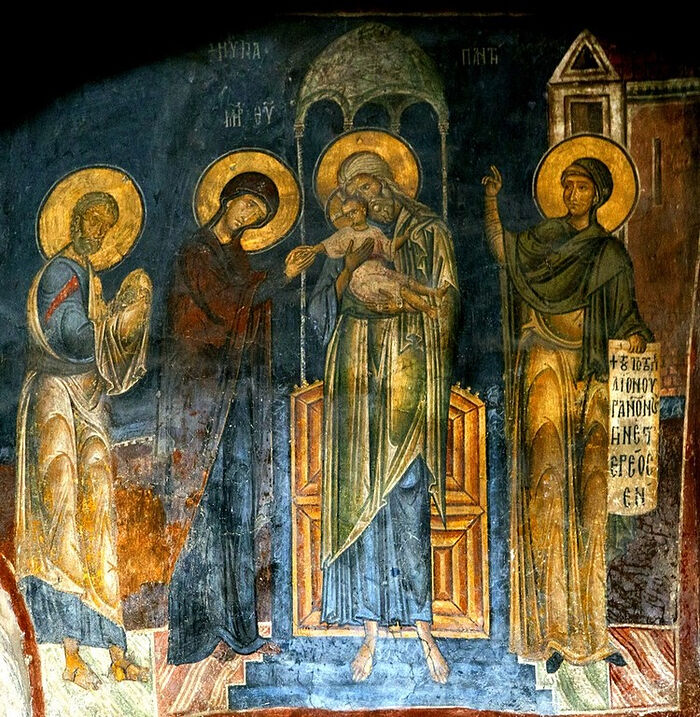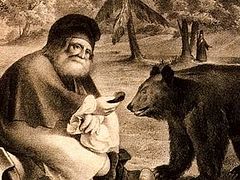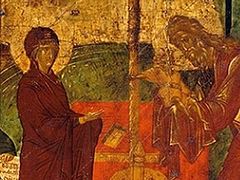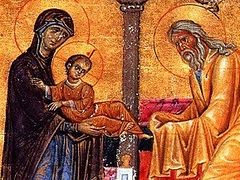Lord, now lettest thou thy servant depart in peace…
The feast of the Meeting of the Lord tells us about an event that moves our souls—the aged elder Simeon holds in his arms the Divine Infant forty-days-old, and bids farewell to earthly life, raising the immortal hymn to God: Lord, now lettest thou thy servant depart in peace…”
From the lips of the elder we hear a word about peace. How harmonious this word is with the wondrous song of the angels: “Glory to God in the highest, and on earth, peace.” When the Son of God became incarnate, glad tidings were heard on earth; and the elder Simeon also speaks of the peace with which he is ready to move on to the next world. Christ brough us not only peace, but also the joy of the fulfillment of God’s promise to mankind. Therefore when the elder Simeon received the Divine Child, the God-man, in his arms, peace and a feeling of ineffable joy, a feeling of the fulness of human happiness settled into his heart.
The choirs of the heavenly hosts heralded the most important, the most precious thing that God’s appearance in the flesh brings to mankind. And from the lips of the elder Simeon, we hear not a sigh of his soul’s relief as it casts off the heavy burden of waiting for the Messiah and finally gains the repose of death. No, from his lips sounds forth a hymn, a magnificent hymn of new life and joy proceeding from the knowledge of God born of a virgin. The elder, who has vast life experience—after all, he’s around three hundred years old—knows what is the dearest and most important thing in life, and he preaches in this blessed moment the blessed state of his soul: Lettest now thy servant depart in peace.
How did this elder attain to those heights of blessedness, that he should be the only one of those born on earth to be vouchsafed to behold “the mystery hidden before the ages” and receive into his embrace “as an infant, the Lord of glory and salvation of the world”? The Gospel answers this question in brief words: He was just—in this word is expressed the elder’s love of neighbor; and devout—in this word is emphasized his love for God; waiting for the consolation of Israel—these words speak of his faith in the promised Messiah and Savior.
Yet there was something more about elder Simeon: And the Holy Ghost was upon him. And it was revealed unto him by the Holy Ghost, that he should not see death, before he had seen the Lord’s Christ (Lk. 2:25–26). The expectation of this meeting had become the elder’s aim in life, as he outlived all his contemporaries. In the bodily infirmity of deep old age, he was strengthened by his holy faith and hope that he would meet on earth the promised Savior of the world, and only then would the path of his earthly life end. This faith never wavered in him. It grew in him and ruled all his thoughts, desires, and actions. Simeon’s living faith purified his heart beforehand so that he could see God with his physical eyes; it adorned him with the inner beauty of virtue, he became just and devout, and the Holy Spirit rested upon him. And just as all that is divine is revealed in man’s life suddenly and wondrously, simply and unexpectedly, so it was for elder Simeon. He came by inspiration to the temple and there met the awaited Messiah. He took Him into his arms, blessed God, and said, Now lettest Thou Thy servant depart in peace.”
Who of us can describe the joy and gladness in that elderly soul, when his eyes beheld the Savior of the world? Death was no longer frightening—he would go without fear and dread to meet a new, eternal life! What was there to for him fear in death, when he held in his arms the Conqueror of death!
My dear ones, in Christ each of us can share and experience elder Simeon’s joy. That grace-filled peace, which visited the soul of the God-Receiver, is not alien to us; it is near to us. The holy apostle Paul says, “Christ is our peace” (cf. Eph. 2:14); and we have an intimate and ineffable communication with Christ in our living faith, in works of love, in our striving toward righteousness and piety, in the holy sacrament of Communion.
Standing by the doors of Great Lent and repentance that are opened before us, we and our whole parish family now prepare ourselves for this great Mystery, hymning Christ the Son of God, Who has come to us and preached peace to you which were afar off, and to them that were nigh (Eph. 2:17). The Lord comes to those who love that peace, and dwells in their hearts. Amen.




